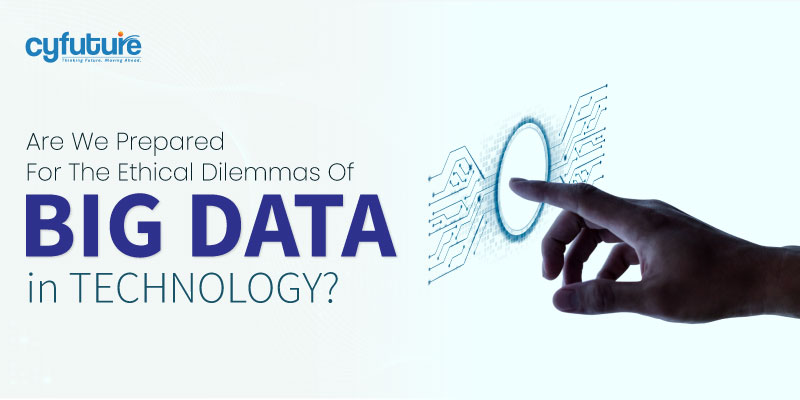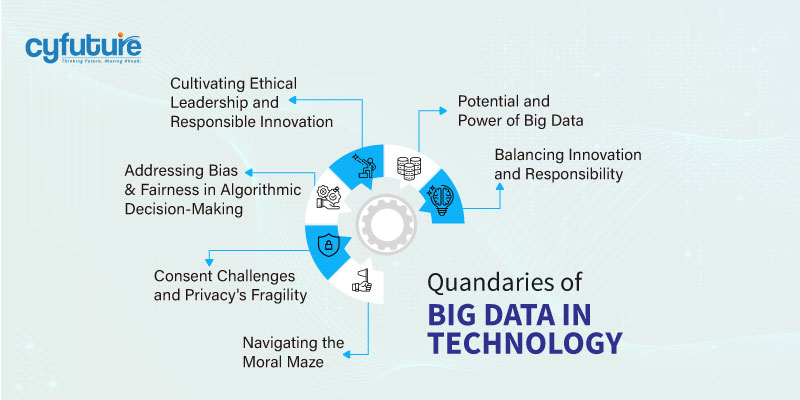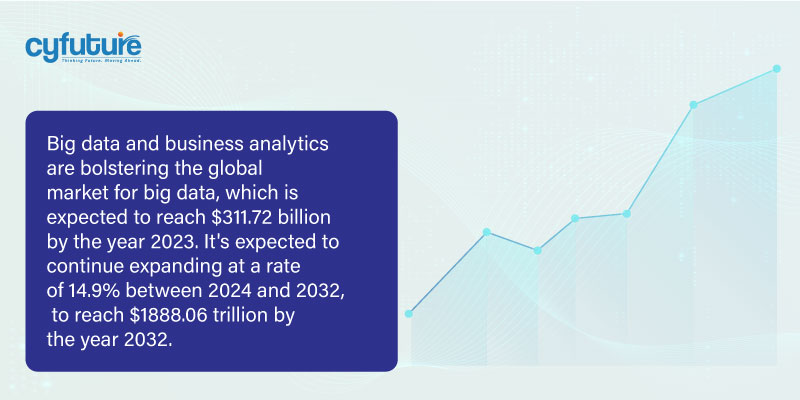-
Get Cloud GPU Server - Register Now!
Toggle navigation

Throughout the vast internet, each click, swipe, and tap creates a digital trail. This richness, aptly dubbed “Big Data,” is the jewel of modern technology and is the foundation for everything that works. Ethical conundrums that cast doubt on the marvels that this vast data repository has unleashed are putting our basic understanding of technological advancement to the test.
Imagine a world where algorithms decide what news we read and how we perceive reality. Where our data is not just a commodity but a currency traded in the digital marketplace. The promise of innovation clashes with the perils of privacy invasion, algorithmic bias, and societal manipulation in the paradoxical landscape of Big Data.
As we stand at the crossroads of this digital age, we must ask ourselves: Are we truly prepared to confront the ethical dilemmas associated with the unprecedented power wielded by Big Data in technology?
However, let’s take a look into a few stats and data before delving deep.
We will explore the twists and turns that challenge our moral compass in the realm of data-driven technology as we embark on a journey through the labyrinth of ethical quandaries.

Let’s find out what big data is all about before we tackle the moral quandary. Each online interaction leaves behind a trail of data, from social media posts and search queries to online purchases and location data. This flood of information has the potential to transform industries, propel innovation, and enhance the quality of life.
Every aspect of our lives has been transformed by big data, promising effectiveness, ease, and individualization. Enterprises can utilize this technology to gain unprecedented insight into consumer habits, allowing them to tailor goods and services to satisfy distinct needs. Furthermore, in fields like medical care and research, Big Data aids in discoveries, and early disease detection, and accelerates drug creation, thereby evoking hope for a brighter future.
The widespread use of Big Data in technology raises significant ethical concerns that cannot be overlooked. The conflict between ingenuity and accountability, progress and privacy, is the source of this dilemma. The most pressing issue is the commercialization of personal information, where individuals unknowingly trade their privacy for digital access.
The Cambridge Analytica scandal, in which the identities of millions of Facebook users were obtained without their consent for political purposes, serves as a stark reminder of the dangers of unregulated data collection. Surveillance capitalism, where tech giants accumulate substantial amounts of data to fuel targeted advertising and behavioral manipulation, prompts fundamental inquiries regarding consent, autonomy, and the commodification of human experiences.
Accountability and equity are hampered by the opaque nature of algorithmic decision-making. Existing biases in hiring, lending, and criminal justice are reinforced by biased algorithms. As algorithms influence our lives, the need for transparency, accountability, and algorithmic fairness becomes paramount.

These ethical dilemmas require a multifaceted approach that balances innovation with responsibility. Transparency and consent are needed to empower individuals to make informed choices about their digital footprint.
Data protection regulations must be sufficiently robust to safeguard personal information without hampering creativity in the digital age. Tech firms need to have a culture of ethical awareness and accountability to avoid ethical lapses and minimize harm.
The ethical use of big data in technology requires cross-disciplinary collaboration between tech pros, moralists, decision-makers, and the rest of society. Initiatives like the IEEE Global Initiative on Ethics of Autonomous and Intelligent Systems and the Partnership on Artificial Intelligence aim to foster dialogue and collaboration on ethical issues in technology. These initiatives are intended to pave the way for a more ethical and inclusive digital future.
The pervasive reach of Big Data has made privacy a rare and precious commodity. Tech companies and advertisers can collect, analyze, and make money from every online interaction, device we use, and the app we download. The loss of personal privacy raises fundamental concerns regarding autonomy, consent, and the commercialization of personal data.
Privacy policies and consent forms are ubiquitous in the digital realm, but they often hide the true extent of data collection and usage, hidden beneath layers of legalese and fine print. Furthermore, the concept of informed consent becomes increasingly tenuous in a world where data collection is pervasive and often invisible to the user. When the terms are governed by opaque algorithms and intricate data ecosystems, how can individuals authentically consent to the utilization of their data?
The fragility of privacy is further exacerbated by the prevalence of data breaches and cyberattacks, which expose sensitive personal information to malicious actors. Data ranging from debit and credit card numbers to medical records and intimate interactions is susceptible to exploitation and misappropriation. Identity theft, financial damage, and irreparable damage to individuals’ reputations and livelihoods are some of the devastating effects of data breaches.
The issue of bias and fairness is becoming more important as algorithms increasingly influence our lives, from determining credit scores to influencing employment decisions. Algorithms are not immune to biases, reflecting and even exacerbating societal inequalities in their decision-making processes.
Predictive policing, for instance, has been shown to employ biased algorithms that disproportionately target minorities, perpetuating systemic racism and escalating conflicts between law enforcement and disadvantaged groups. Equally, erroneous selection procedures can perpetuate sexist and racial disparities in employment possibilities, thereby enhancing disparities in the workplace.
To combat bias and ensure impartiality in computer-based decision-making, a holistic approach is required, encompassing algorithmic openness, variety in data collection, and rigorous testing and validation procedures. Furthermore, it requires ongoing surveillance and mitigation efforts to spot and correct bias when it manifests.
The moral maze of Big Data in technology lies at the heart of the moral imperative for moral leadership and responsible innovation. Ethics and integrity should be placed at the forefront of tech companies and industry leaders’ decision-making processes.
A firm commitment to transparency, accountability, and proactive risk management is required for ethical leadership. Additionally, it is important to foster a culture of ethical awareness and empowerment within organizations, where employees are encouraged to speak up against unethical practices and challenge the status quo. Besides, it is important to foster a culture of ethical awareness and empowerment within organizations, where employees are encouraged to speak up against the quo.
Furthermore, responsible innovation requires collaboration and dialogue among diverse stakeholders, including technologists, ethicists, policymakers, and members of civil society. Discussions about the moral implications of tech can help us identify obstacles, spot dangers, and craft strategies that benefit everyone.
In conclusion, the moral dilemmas posed by big data in technology present a complex and multifaceted issue that requires prompt attention and a thoughtful solution. The promise of technological advancement and the requirement of ethical duty must be balanced as we navigate the moral minefield of data-driven innovation.
Strong legal frameworks, open procedures, and ethical culture in the technology industry are necessary to address important issues including privacy, consent, bias, and fairness. To develop ethical norms and principles that respect individual rights while advancing the general good, a variety of stakeholders must collaborate and communicate with one another.
Though there are severe challenges ahead, there are causes for optimism. A growing understanding of the importance of ethical dilemmas in technology progress is shown in initiatives like the Partnership on AI and the IEEE Global Initiative on Ethics of Autonomous and Intelligent Systems. By embracing ethical leadership, responsible innovation, and a commitment to transparency and accountability, we can harness the transformative power of Big Data and build a future that is not only creative but also morally sound and inclusive of all.
As we set out on this journey, let’s combine the knowledge from the past with the insights from the present to create a future where technology advances humanity’s most admirable objectives. Let us pave the way for a day when courage, compassion, and conviction are used to confront the moral conundrums posed by big data in technology.
Participate in the discussion on the ethics of big data in technology and work for a future of technology that is more morally sound. We can overcome the challenges posed by data-driven innovation and build a future where technology works for everyone’s benefit if we work together.
Big data in technology presents ethical challenges, such as the misuse of personal information for ad targeting or political manipulation, the propagation of biased algorithms that perpetuate discrimination, and the deterioration of personal privacy protections. These issues challenge our understanding of technology’s role in society and demand thoughtful ethical considerations. They challenge our understanding of technology’s role in society.
The ethical dilemmas of big data necessitate a comprehensive strategy that incorporates government oversight, industry best practices, and individual accountability. Ethical and responsible data collection and usage can only be achieved through transparency, accountability, and consent. Furthermore, fostering a culture of ethical awareness and empowering users to make informed choices about their data can help mitigate the risks associated with Big Data in technology.
By prioritizing ethical considerations in their business practices, businesses and technology companies can contribute to addressing ethical concerns surrounding Big Data by prioritizing ethical considerations in their business practices. Regular ethics training for employees and actively engaging with stakeholders to identify and address ethical challenges are some of the things that this includes. Businesses can earn the trust of their customers and stakeholders by fostering a culture of ethics and responsibility by demonstrating their commitment to ethical behavior.
Ethical guidelines and standards are being created by industry organizations, ethics committees are being established within tech companies, and ethics is being incorporated into the design and development of data-driven tech. Furthermore, the cross-disciplinary collaboration among techies, moralists, decision-makers, and civil society is encouraging dialogue and creativity in the realm of Big Data morality.